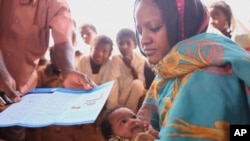More than one million children die each year from severe diarrhea and pneumococcal disease. Today (Tuesday), the GAVI Alliance announced an expanded campaign against the two leading killers of children worldwide.
The Global Alliance for Vaccine Immunization (GAVI) is providing new funding for vaccines in 37 more developing countries. Most are in sub-Saharan Africa. That brings the number of countries where GAVI provides childhood vaccines to 72.
“This is an unprecedented ramp-up for us to introduce new vaccines to poor children in poor countries,” said Jeffrey Rowland, GAVI’s chief spokesman.
Leveling the playing field
“Sixteen developing countries will receive funding to introduce the rotavirus vaccine. Rotavirus is the biggest cause of severe diarrhea in children under five years of age. And then 18 more countries will receive funding to introduce the pneumococcal vaccine. Pneumococcal disease causes pneumonia, meningitis and sepsis. Pneumonia and severe diarrhea are the two biggest childhood killers in the world in absolute terms,” he said.
Expanding the availability of these vaccines creates a level playing field.
“It means that children in poor countries finally have the same right as kids in richer countries, getting the same kinds of protection against vaccine preventable diseases. Kids in the United States, for example, have been receiving the vaccine against pneumonia since 2000,” said Rowland.
Paying the bill
The GAVI Alliance held its first pledging conference in June. Donors promised $3.4 billion over the next 5 years. That’s $600,000 more than GAVI had actually requested. GAVI officials say donors recognize that childhood vaccines have a very good return on investment.
The vaccine against pneumococcal disease costs about $3.50 per dose, while the rotavirus vaccine costs about $7.00 per dose. However an announcement is expected in October about a significant drop in price for the rotavirus vaccine.
While GAVI pays the bulk of the cost, countries are required to pay a share, usually about 20 cents per dose.
Sudan is among the countries now receiving the two vaccines, but South Sudan is not. Before they can be administered in South Sudan, at least 50 percent of the children there must be up to date on their vaccines for diphtheria, pertussis and tetanus. GAVI is currently working with health officials to make that happen.
In all, the alliance plans to immunize over 250 million children by 2015.




